Recent Blog Posts
Destination: Ulleungdo (part 2)
Where we left off, I had gone back to my hotel to relax and freshen up. After awhile, I headed down to the harbor for some dinner (PROTIP: don't bother - it's overpriced) and see what sort of night life the locals enjoyed:
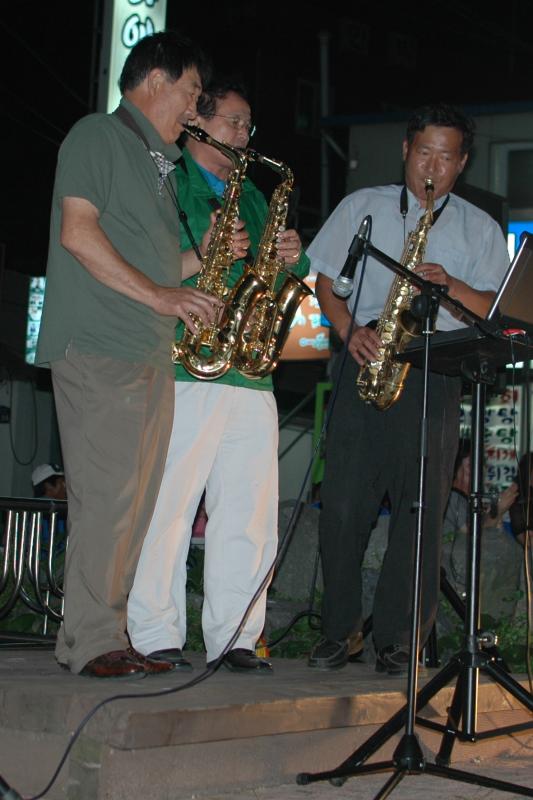
While I couldn't tell they do this every night, the trio of saxophonists seemed pretty comfortable on the harbor's stage.

Some seemed fine with sitting and enjoying the 트로트 (trot, or traditional Korean songs), but a few more intoxicated people got up and danced. After awhile, listening to trot got a bit boring, so I meandered down by the harbor. On either side of the harbor from the mountainside is a set of trails - plenty of beautiful views even at night:


A look back at the town and harbor. Time to call it a night...
Waking up early was not part of the plan. Thus, when the sun began peeking in through the window, I blocked the window with an extra blanket and rolled back over. Sorry, but it's my vacation, and waking up at 6am is not part of the fun.
After waking up and packing up, my first stop was the Yaksu park (약수공원) area. A ten minute walk uphill from the harbor, it's one of the most accessible destinations on Ulleungdo.
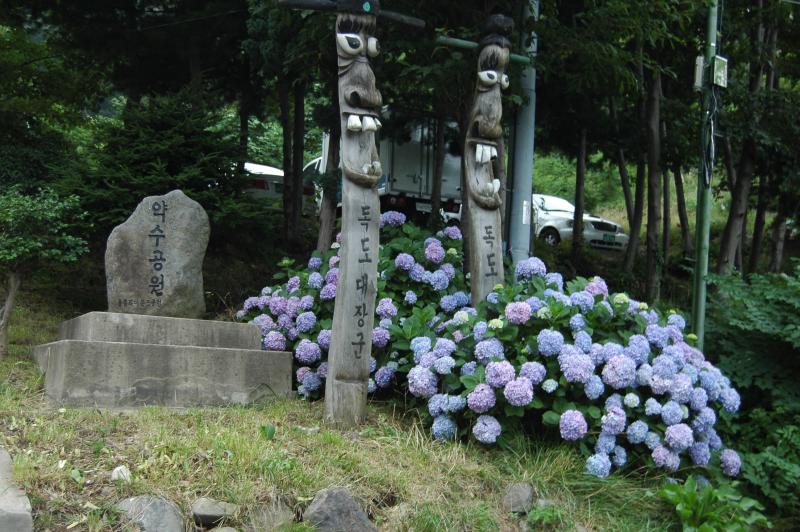
The 장승 (jangseung) (odd faced poles) welcome you to the park. Look left after climbing up the hill for an additional treat:

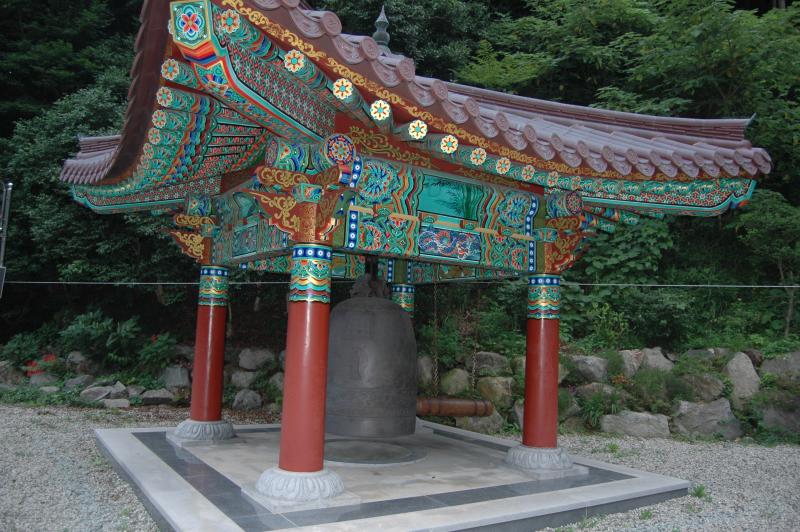
해도사 - Haedosa or Haedo temple. A fairly new and small facility, there was nobody around except for a few passersby. No matter - appreciating beauty sometimes requires nothing other than the sights themselves.

The first major attraction of the park is the naturally flowing mineral water (약수, yak-su) - slightly carbonated and bitter, but supposedly 'well being' - that classic Konglish way of saying it's healthy or good for you. Bring your own bottle, or sip out of the communal cups with a handle.
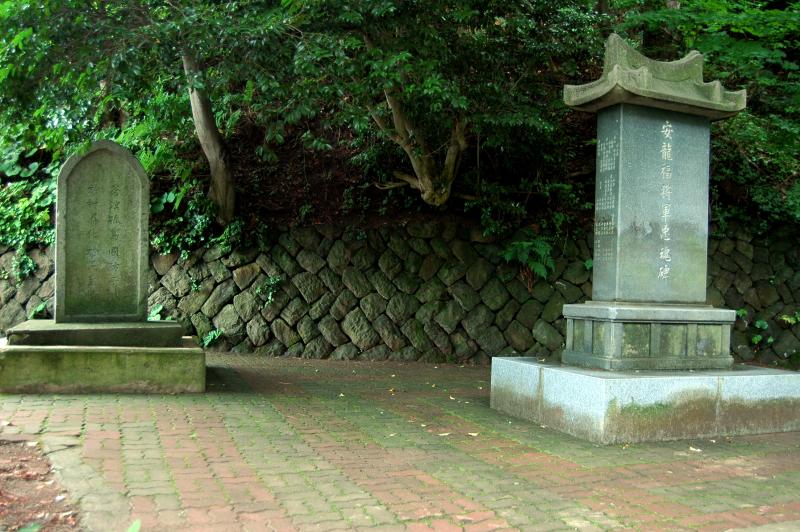
Walk about the area to see these two monuments - two mysteries to this English speaker, as no description is around to learn more.
The area also features a museum for Ulleungdo's heritage (향토사료관 - literally, 'local museum'):

A sign of things to come - Both Dokdo and Ulleungdo are featured in this view.

This monument was discovered in 1937 during construction of Dodong harbor. According to the engravings on the rock, the Joseon dynasty had a policy of suto, of moving islanders to the mainland. From January 1711 to December 1712, a general named Park Seok Chang was responsible for forcing the islanders to move. This monument is thought to be the list of people that was forced to move to the mainland.
People lived on Ulleungdo before at least 512 A.D., when the Silla dynasty started received tributes from Usan State (present-day Ulleungdo). A few years later in 1998, a research team from Seoul National University discovered three monuments and pottery surmised to be from this era. Although there's plenty more to learn about the history of the island's original natives, there are more displays of life on the island than descriptions of its history.

A hook for fishing squid; not pictured are a number of other fishing tools and pottery remnants.
Don't forget about the Dokdo museum on Ulleungdo - I'll write up a separate post about that area.
With time running short until the ferry home, I head back to the bus stop and wait for the next bus heading east. While waiting, I went down to the harbor and shot a few seagulls flying near the harbor:

Stay tuned for part 3 of the Ulleungdo trip, including a hike up to one of the island's waterfalls.
Directions to Yaksu Park: Get to Ulleungdo. From the port, walk uphill towards town. Just past the tourist information center, there are two ways up - take the left one. Pass the bus stop, then follow the road as it bends right, then take the first left after the police station. It's another 200 meters up a steep hill, and your calves will probably be thankful for a break somewhere along the way.
Share ![]() Bookmark this on Delicious
Bookmark this on Delicious
This post was originally published on my blog, Chris in South Korea. If you are reading this on another website and there is no linkback or credit given, you are reading an UNAUTHORIZED FEED.
Who do you ask for directions in Korea?
1. The very obvious: bugs. I asked my co-teacher about bug spray but she wasn't entirely sure where to buy it or the generic Korean word for it. Something tells me that I'll be miming in a store in the near future.
2. Evangelists on street corners trying to prevent us from getting to our meeting place. Usually it's the Jehovah's Witnesses but last night it was the 'Our Holy Mother' people. All of them realized that with 70+ foreigners in the area it was time to upgrade to carrying pamphlets in multiple languages. Three of us made it by but they caught Blondie for a minute. Silly polite Blondie.
3. Rubber neck stares. It's like people driving by a traffic accident, they slow down and keep watching as they go by. Fortunately, the conversation was interesting enough that it wasn't too distracting.
4. Interruptions. Now, if you were a lost Korean and there are plenty of Koreans around, why on earth would you ask the group of obviously foreign people for directions? To be fair, we did know where she was trying to go...we just couldn't exactly express it coherently in Korean.
5. Witnesses. Today one of the teacher's at school was so excited to tell me that she saw me last night. Actually, it was kind of awesome because she was so curious that she didn't mind using Korean and English to try to explain what she had seen and her questions. It was our first real conversation together and I really enjoyed it. It means that I probably won't go the entire day without speaking to anyone if I have already had one real conversation before 10am. That could just be wishful thinking though.
To do today:
1. Read another 100 pages in Anna Karenina.
2. Book a hostel for Siem Riep and Kuala Lumpar.
3. Write an article that's due tomorrow... (oh procrastination...why do I allow you to happen).
4. Go for a run. New route today and hopefully it will cool down a little once the sun goes down. Attempt to not trip over my own feet.
5. Attempt to not expire from extreme boredom/ennui while desk warming.
6. Maybe study? Ennui has killed my zeal for studying. Hopefully vacation will revitalize my insane passion for over-achievement.
American Missive
I have much to write and report on. Things have been quiet here during this trip, as I chose to live more in the real world than in internet land (facebook notwithstanding), but there is plenty to digest and spew upon this here aging and creaky journal.
Stay tuned.
Korean Bowling!!
Bowling! from Jamie Lomazzi on Vimeo.
Mud Day
The first night we kept it pretty clean…
.
.
but it still went late, and a few beers were downed the next afternoon before we even discovered the grounds. The girls and I entered in a trio of cheap white tanks we’d bought in Nampodong the weekend before…
.
.
until we spotted the Mud Prison, an obvious place to start the festivities.
.
.
A Koren man sprayed us down behind bars…
.
.
.
then it was off to the slide…
.
.
where we waited in line for a crazy long time…
.
.
but didn’t really mind…
.
.
because when you’re muddy with friends…
.
.
and some random dudes you’ve just met…
.
.
who cares how long the line takes?
.
.
Daecheon Beach was still there when we moved from slide to sand…
.
.
.
and stayed until the tide crept high, steering us back to the hotel, the shower, and dinner with some sweet new Busan friends.
.
.
Boryeong Mud Fest 2010: I recommend.
Welcome
I'm back to the blog world! Get ready. Now it is Korea.
Korean Sociological Image #46: The Language of Exclusion (Updated)
 ( Source: Mental Poo; reproduced with permission )
( Source: Mental Poo; reproduced with permission )
A receipt from a recent visit by blogger My Jihae to an upscale restaurant in Seoul, about which she wrote:
I’m not sure how many restaurants do this, and why this restaurant bothers to do this in the first place, but on the top of the receipt they blatantly keep track of whether the guests are locals or foreigners. They pegged me right away, I guess it’s that obvious.
For those of you that can’t read Korean, for now let’s say that waegookin (외국인) on the right generally means a foreigner, and naegookin (내국인) on the left a Korean person. And that does indeed describe My Jihae and her dining partner respectively, although she is actually Korean-American. But why bother to note the distinction between two ethnically-identical customers at the same table?
Some commenters to her post speculate that it may have been done for taxation purposes, which I wrote would be something good to know if true, as otherwise:
…many expats (myself included) may simply chalk things like this up to Koreans typically and completely unnecessarily pointing out our foreignness, when in fact they may be nothing of the sort.
And see Occidentalism here and here for a similar case in Japan. Unfortunately however, not all perceived Korean tendencies towards exclusion are simply misunderstandings on the part of non-Koreans.
Take the “Waegookin Shock Meltdown” for instance, which describes the situation:
…where when speaking in Korean, Koreans freeze up because they have some silly preconceptions that foreigners simply ‘can’t’ speak Korean or that they just ‘shouldn’t’ speak to us in Korean – the latter which comes without the help of the government and medias insistence in the last 10 years or so that ‘globalization’ means that Koreans should all have to speak English whenever they encounter big-nosed white people.
 ( Source: unknown )
( Source: unknown )
And which personally used to get me extremely frustrated and angry while learning Korean a few years ago, although now I believe that that reaction from Koreans more often stems from simple inexperience and/or nervousness in dealing with non-Koreans. Still, whatever combination of factors are responsible in any given case, all have clear solutions, something which can not be so easily said of the ways in which Korean notions of nationalism, citizenship, and even the Korean language itself arguably inherently exclude others. Focusing on the latter in this post, I identify 2 main ways in which it does so:
First, because Koreans might take a vacation to New Zealand, say, and describe New Zealanders as waegookin while they’re there, so clearly “foreigner” doesn’t quite cut it as a translation. Perhaps “non-ethnic Korean” would be more suitable? But then what about about My Jihae back in the restaurant?
Given such confusion, then as you might expect the question of the most appropriate English term has already attracted a great deal of attention from many generations of expats, and so if you can forgive my heemanggomoon (희망고문; literally “hope-torture” or “stringing someone along”, and one of my favorite Korean words), I’ve decided that it would be unhelpful to repeat any of that here. Instead, let me refer you to this excellent post by regular commenter Seamus Walsh for the most recent and comprehensive discussion of this aspect of the language issue (but this and this post by others are also helpful), only passing on myself what I wrote in my own post on it 2 years ago:
It may not sound like much, but like I said in this forum, Korea’s (and Japan’s) bloodline-based notions of nationalism and citizenship emphasize and exaggerate the differences between natives and non-natives to an extent rarely found elsewhere in the world, and the constant reminders of these quickly become wearisome to anyone who’s spent even just a few months living here, let alone 8 years. And ironically, constantly hearing the term waegookin in our daily lives probably means that we come to adopt some of the same notions of division and distance ourselves too, and the effect snowballs.
 Naturally, Seamus also covers the the second reason in that post, the fact that Koreans never say “my home”, “my wife”, “my language”, or “my country” for instance, but say “our” (우리) instead. And that I can add something useful to here, as by coincidence there was recently a lively discussion on that very topic on the email-based Korean Studies Internet Discussion List, prompted by the following question by William Pore of Pusan National University (image: Asadal Thought):
Naturally, Seamus also covers the the second reason in that post, the fact that Koreans never say “my home”, “my wife”, “my language”, or “my country” for instance, but say “our” (우리) instead. And that I can add something useful to here, as by coincidence there was recently a lively discussion on that very topic on the email-based Korean Studies Internet Discussion List, prompted by the following question by William Pore of Pusan National University (image: Asadal Thought):
Dear List:
For any comparative Asian linguists, Ural Altaic linguists (?), or, maybe even Korean linguists on the list, I would like to inquire if a pronoun similar to the Korean we (i.e. ‘uri’) occurs with the same frequency/prominence in any related languages to the same degree that it does in Korean. Should we accept the assertion that I nearly always have had that the prominence of that pronoun in Korean is due to a particular Korean mindset alone?
And rather than have you scroll through the full June archive yourself, my contribution is in presenting a truncated and much(!) more readable version of the most pertinent comments instead. Starting with JMF’s reply then:
Perhaps this is not directly related, but I witnessed some very interesting aspects of “uri” while raising my daughter in Korea. Not only my daugher but all of her “pure Korean” friends as well naturally used the words “I/my” almost exclusively. I saw and heard all of them say in Korean “my house,” my school,” “my Mommy/Daddy,” etc. Of course, they were quickly corrected/reprimanded by parents and teachers until they capitulated and began to use “we/our” almost exclusively where they had once felt that “I/my” was more natural. In a word, ”uri” is not somehow “organic” to Korean-ness or Korean language but rather externally injected and enforced.
Frank Rudiger, University of Vienna:
And here comes something even less directly related, yet not completely unrelated: In Russian, there is a similar way of saying “we” when actually meaning “I”, for example “me and my mother” would literally be “us with mom” (my s mamoj). In other words, this is not necessarily a purely Korean phenomenon. I guess Russian is not the only example. What about “we won” (wir haben gewonnen) meaning “our team has won” in German (at least)?
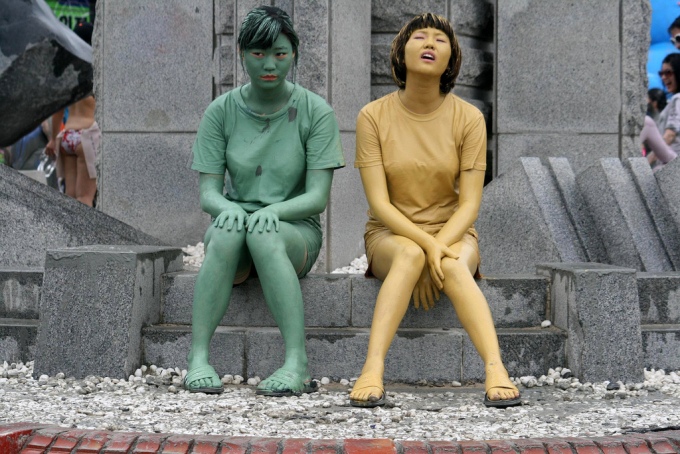 ( Source: Stinkie Pinkie )
( Source: Stinkie Pinkie )
Dr. Balazs Szalontai, Mongolia International University:
In Mongolian language, which has some interesting grammatical similarities with Korean, this practice is carried even further. One would often hear a lady utter the term “manaa nuhur” (our husband), rather than “minii nuhur” (my husband), though she supposedly does not intend to share the said individual with any additional ladies.:)
Alison Tokita, Tokyo Institute of Technology:
I know Japanese much better than I know Korean, but clearly the Korean uri has its equivalent in Japanese language and usage. The Japanese equivalent of uri has indeed been very frequent in recent decades as an aspect of Nihonjinron (theories or discourse of Japanese uniqueness), but is probably declining in the younger generation. The Japanese equivalent actually uses archaic forms of the pronoun. Some examples:
Japan is expressed as not only Nihon, but as waga kuni (our country; cf the softer watashitachi no kuni). The Japanese are not only Nihonjin, but wareware Nihonjin (we Japanese). My or our house can be wagaya (cf watashitachi no uchi).
Then there is the use of koku (country, nation): Japanese literature is koku bungaku (recently the use of Nihon bungaku is starting to replace this); Japanese history is kokushi (now changing to Nihonshi); Japanese (national) language is kokugo: what is taught to Japanese in schools is kokugo and what is taught to non-Japanese is Nihongo.
The use of our and national instead of the country name conveys a somewhat closed country, nationalistic mentality, and as Japan is becoming more internationalized this seems to be going out of favour. These are only my impressions, but others may know of research on this linguistic phenomenon.
Dr. Edward D. Rockstein:
Of course, the usage of koku [a Sino-Japanese loan word] you describe has antecedents in Chinese usages such as guoyu national language, guoshi national history, guowen national writing system or national literature, ddeung ddeung, nado nado, deng deng.
And by Owen Miller, with a similar example from England that I was very surprised and happy to see as a former Geordie myself(!), and with most of my extended family still in the region:
I wouldn’t like to step to far into the territory of the linguists on this list but I really wonder whether the case can be made empirically that the pronoun we is more frequent in Korean than in other languages. While I’m sure that John Frankl is right about its enforced use (as a result of ideological norms of national and familial collectivity that probably have relatively recent *historical roots), this doesn’t mean that it isn’t used **frequently** in similar ways in other languages. *
The use of the ‘national we’ is not uncommon in the UK, although perhaps uncommon enough that it makes me wince when I hear it. For example, teaching the First Opium War last year I found myself feeling strangely uncomfortable when the students spontaneously started discussing how terrible it was that ‘we’ had done this bad thing to China.
In certain British English dialects ‘we’ is also very commonly used in the way that Ross King describes above (exclusive first-person plural pronoun) in non-national contexts. For example, the Geordie English pronoun ‘wor’, as in ‘wor lass <http://en.wiktionary.org/wiki/wor_lass>’.
It strikes me that the Korean discourse on the use of ‘uri’ is probably something of a self-reinforcing feedback loop: Encourage the use of a word in official discourse so as to strengthen national collectivity –> discover that word is used frequently –> find that this is evidence of strong national collectivity –> further encourage use of word etc etc.
Finally Jonathan:
Is there evidence of widespread vernacular use of uri prior to the twentieth century? I ask because I wonder if its use was prompted by the Japanese use of ware as in wareware Nihonjin?
And after all that, a clear message that this lingusitic feature of Korean is by no means as unique to Korean as many of us probably thought!
Thoughts?
Update 1: 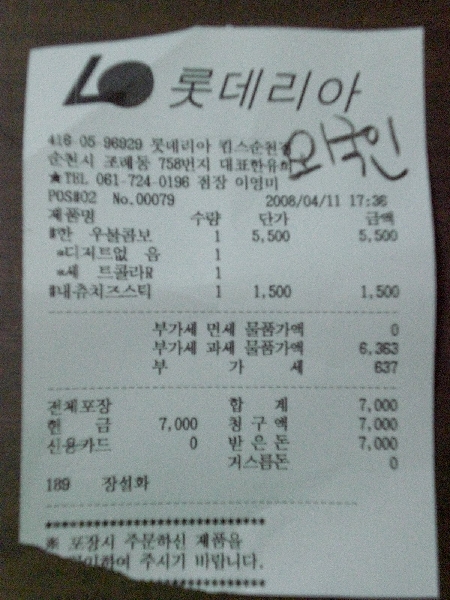 As several people have suggested in the comments, and Sara confirmed, the reason that upscale restaurants keep track of non-Koreans is so that they can determine which dishes are the most popular among them, and adjust their menus accordingly. Which is certainly nothing to get upset about, but then wouldn’t actually be all that helpful either, and it would make much more sense to note customers’ nationalities instead (provided staff had the ability to politely ask them).
As several people have suggested in the comments, and Sara confirmed, the reason that upscale restaurants keep track of non-Koreans is so that they can determine which dishes are the most popular among them, and adjust their menus accordingly. Which is certainly nothing to get upset about, but then wouldn’t actually be all that helpful either, and it would make much more sense to note customers’ nationalities instead (provided staff had the ability to politely ask them).
Regardless however, certainly Koreans in the service industry do frequently unnecessarily keep track of customers which are non-Koreans. As I originally thought Brian in Jeollanam-do‘s receipt on the right was a prime example of for instance, but after reading his explanation:
In my case, I was at a Lotteria (shut up, it’s pretty good) in a Kim’s Club next to my apartment, and the “foreigner” was to help identify who the take-out order went to. Just to preempt any commenters from James’ post, no, I’m not terribly offended and it’s not the worst thing to ever happen to me. It’s just an odd default term considering the people working the counter usually just announce the order to the crowed in order to connect people with food. There’s no reason not to just announce “Bulgogi Burger set,” or whatever, unless the person assumed I wouldn’t understand the announcement. A good posibility, in spite of me having ordered in Korean.
…then I realize that it would indeed make sense to identify a foreign customer if the person taking his or her order felt that they’d be unlikely to understand their announcement. But I disagree with Brian’s first last line though (why assume that someone who can order in Korean couldn’t also understand that it’s arrived?), and which is just the sort of thing which so aggravates me about speaking Korean in this country like I explained. Hence the “외국인” was actually unnecessary then, but rather more because of the Lotteria worker’s preconceptions of non-Asian foreigners’ Korean ability (they would never do the same to a Japanese person) than anything inherent to the Korean language.
Either way, it’s good to remember that whenever one is highlighted like this, then it could be for any number of reasons, and 99% of the time the people responsible do not mean to and are probably completely unaware that they may be causing offense. Moreover, as Brian’s discussions here and here of decades-old journal articles on this subject attest to (see this one at Gypsy Scholar also), this is something one just has to get used to.
Update 2: See The View From Taiwan for a similar issue with terms there.
(For all posts in the Korean Sociological Images series, see here)
Filed under: East Asia, Korean Demographics, Korean History, Korean Sociological Images, Overseas Koreans Tagged: 외국인, waegookin





 RSS Feed
RSS Feed















Recent comments